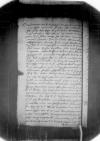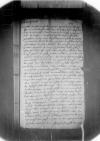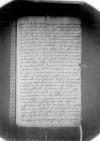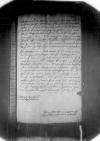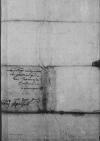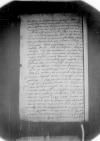Ich hab nit underlassen kunnen E(uer) L(ieb) zuversten zugeben, wy es mir gehe / und wyl E(uer) L(ieb) nichtz pergenn. E(uer) L(ieb) dy tragen ungezweyfeldt noch in f written over t⌈tff written over t⌉rischer gedechtnus, / wy mich ⌊keyserlich maiestadt⌋ gnediglich mit zwa dausendt ducat(en) pension auff dem bistum ⌊Salamanca⌋ versehen haben, / darauff ich meyne pullen expedirt, dy mich XI hundert duc(aten) gekost, selche dem ⌊bischoff⌋ insinuieren lassen, / der dan darauff gar nit hadt geben wellen, / sunder vyl fauler aufzug gesucht, / dardurch ich verurschacht pin word(en). / Und mich in eygener person auff der post zw ⌊keyserlicher maiestadt⌋ begeben und irer maiestadt selchs geclagt, / welche yr maiestadt nit wol gefallen, / sunder gesagt, sein maiestadt well in woll dohin halt(en), das ⌊er⌋ mich wezalen mus was er dan schuldig ist, / und darauff ein ernstlich schreyben an in thun lassen, / mich in albeg zuentricht(en). / Aber der ⌊bischoff⌋ hadt darauff keyn antbort gegeben sunder gesagt, er wel selbst zw ⌊ir maiestadt⌋ schicken und der sachen recht bericht(en) lassen. Als aber nun ⌊keyserlich maiestadt⌋ gesehen, das er mit faulen possen umbgehe / und mich lang aufzuzyhen furhadt, / hadt mir sein maiestadt wyder gnediglich erlabpt / und gesagt, ich sel kein zweyfel daran haben, / well in dahyn halt(en), ⌊er⌋ musse mich bezalen aber ein anders thun. /
Auff selche gnedige wordt pin ich auff der post wyder in das ⌊Theutzlandt⌋ postirdt, / und pin zw ⌊Aschaffenburgk⌋, do mich  BCz, 1637, p. 450 dan E(uer) L(ieb) vor zweyen jaren gelassen haben. / So hadt mich ⌊keyserlich maiestadt⌋ in meyner abfertigung genediglich mit dausent ducat(en) vereret und mich gepet(en), das ich mich wyder an irer maiestadt hoffe thun wolt, / das ich dan alsodt irer maiestadt zugesagt hab, so fer das mich ir maiestadt meyner
austendig(en) or anstendig(en)⌈austendig(en)austendig(en) or anstendig(en)⌉
schulden vor gnediglich entricht(en) wellen. / Welchs ⌊ire maiestadt⌋ alsodt zugesagt, / wan sy in ⌊Castilia⌋ kemen, seldt ich derhalben durch doctor ⌊Mathias Held(en)⌋ vicecancelliren ansuchen lassen. Wolt mich ⌊sein maiestadt⌋ gnediglich entricht(en) lassen / und damit ich mich dester passe an yr maiestadt hoff enthalt(en) mocht, so wolt mir yr maiestadt dausent ducat(en) auff der kamer machen verschreyben, / wan ich an yr maiestadt hoff were, / selcher zugenosen hidden by binding⌈[n]n hidden by binding⌉. Alsodt pin ich von ⌊yrer maiestadt⌋ abgeschyden und pin teglich ⌊doctor Mathyassen⌋ antbort gebertig. / So selche gut sein wyrdt, / so zeye ich auff den September wyder in ⌊Hyspaniam⌋.
BCz, 1637, p. 450 dan E(uer) L(ieb) vor zweyen jaren gelassen haben. / So hadt mich ⌊keyserlich maiestadt⌋ in meyner abfertigung genediglich mit dausent ducat(en) vereret und mich gepet(en), das ich mich wyder an irer maiestadt hoffe thun wolt, / das ich dan alsodt irer maiestadt zugesagt hab, so fer das mich ir maiestadt meyner
austendig(en) or anstendig(en)⌈austendig(en)austendig(en) or anstendig(en)⌉
schulden vor gnediglich entricht(en) wellen. / Welchs ⌊ire maiestadt⌋ alsodt zugesagt, / wan sy in ⌊Castilia⌋ kemen, seldt ich derhalben durch doctor ⌊Mathias Held(en)⌋ vicecancelliren ansuchen lassen. Wolt mich ⌊sein maiestadt⌋ gnediglich entricht(en) lassen / und damit ich mich dester passe an yr maiestadt hoff enthalt(en) mocht, so wolt mir yr maiestadt dausent ducat(en) auff der kamer machen verschreyben, / wan ich an yr maiestadt hoff were, / selcher zugenosen hidden by binding⌈[n]n hidden by binding⌉. Alsodt pin ich von ⌊yrer maiestadt⌋ abgeschyden und pin teglich ⌊doctor Mathyassen⌋ antbort gebertig. / So selche gut sein wyrdt, / so zeye ich auff den September wyder in ⌊Hyspaniam⌋.
Und las E(uer) L(ieb) wyssen, das ich in meyner wyderankunfft auf ⌊Hyspania⌋ / ein ⌊⌋ von E(uer) L(ieb) gefund(en), welchs dat(um) stedt ⌊Lobau⌋, den 17 tag Iulii 1533. Welchs ⌊⌋ mich aus grundt meines hertzen erfreudt sunderlich, das ich daraus vernomen E(uer) L(ieb) gesundthadt, welche der almechtig Gott E(uer) L(ieb) nach seyne(n) gottlichem gefallen lange iare mit theylen welle, / und E(uer) L(ieb) wyssen mich istz auch frist und gesundt. Gott hab lob und geb lang.
 BCz, 1637, p. 451
BCz, 1637, p. 451
So pin ich dy fasnacht vergangen pey meyne(n) ⌊brudern⌋ zw ⌊Onoltzpach⌋ gebesen, / do ⌊pfaltzgraff Friderich⌋, ⌊hertzog Heinrich⌋ mit seyner gemahel und ⌊lanckgraff Georg⌋ mit ⌊meyner swester⌋ auch gebesen, / do man / gedantz, gerendt und gestoche(n) hadt und iderman leychtsinnig gebessenn. Under andern ist ein junger edelman da gebese(n), hast mit namen ⌊Eblinger⌋, / der written over y⌈yerer written over y⌉ dy weynacht(en) vergangen pey E(uer) L(ieb) gebesen ist. / Hadt mir fil gutz von E(uer) L(ieb) gesagt, / dardurch ich abnemen mag, das E(uer) L(ieb) meyner noch nicht in verges gestelt haben. Des ich mich dan geg(en) E(euer) L(ieb) freuntlich thue bedanken, / selchs freuntlich zuvordinen / und wolt Gott, das sich mein sachen dahinn schicken mocht(en) damit ich zuvor und ehe ich in ⌊Hispania⌋ zug, mich mit E(uer) L(ieb) underrethen mocht auff fil ursachen, wyllen dy sich dan uberlandt nicht schreyben lassen. /
Ich pin auch meins gnedigen ⌊hern von Meintz⌋ auf dy pfingst(en) wertig wo sein gnadt kome. / Must ich yrgent weg suche(n), damit ich zw E(uer) L(ieb) komen mocht, dan wan sein gnadt im stifft ist, / darff sein gnadt meyner nit. / Der ⌊Ebli(n)ger⌋ hadt mir under andren auch gesagt, wy das ⌊konigliche maiestadt⌋ / E(uer) L(ieb) superinscribed⌈E(uer) L(ieb)E(uer) L(ieb) superinscribed⌉ vertrostung gethan hab, / auff ein ⌊pesser bistum⌋, des ich dan von hertzen gern gehordt hab, / dan es mag E(uer) L(ieb) so wol nich gehen. / So ist es mir so lieb als treff es mich selbst an, / und hoff, so ich zu E(uer) L(ieb) komen werdt, ich well E(uer) L(ieb) in hoherm unnd grosserm standt finden.
 BCz, 1637, p. 452
BCz, 1637, p. 452
Und wans an E(uer) L(ieb) gebesen were, damit ich E(uer) L(ieb) mit dysen meinem schreyben hedt wellen wesuchen, hedt ich zu diser zeyt meyne(n) diner ⌊Bartholome Preusent hidden by binding⌈[sent]sent hidden by binding⌉⌋ nit erlabpt, / aber dan nit ich wyder antbordt von E(uer) L(ieb) haben mug, hab ich inen mit dysem meyne(m) schreyben zw E(uer) L(ieb) vor allermeniglich abgefertigt, / damit E(uer) L(ieb) nicht dencken mocht(en), ich hedt E(uer) L(ieb) vergessen. / Und pit E(uer) L(ieb) wellet sich inen lassen pefollen sein und gegen meynem freuntlichem lieben bruder dem ⌊hertzogen in Preussen⌋ verschreybe(n), damit im sein lieb auch gnedig in seinen anligenden sachen sein well. Er wyrdt auch E(uer) L(ieb) verstendig(en) wy es mir allenthalben auff der rase gangen ist. /
Ich hab warlich mit beschwerem hertzen gehordt, das E(uer) L(ieb) so grosser schad(en) zu ⌊Lobau⌋ durch das feuer geschehen. Pin aber der hoff, Gott der almechtig werd(en) E(uer) L(ieb) hidden by binding⌈[L(ieb)]L(ieb) hidden by binding⌉ paldt in ein grosser nest setzen, / und das stettlein eine(n) andern zupauhen wefellen.
Ferner, freun<t>licher lyber Her, Freundt und Vatter, E(uer) L(ieb) kun(n)en sich nochwol erinnern, als mir peyenander gebesen sein / und von zobelnn rethethen, / das sich E(uer) L(ieb) lisse vernome(n) wo E(uer) L(ieb) pey ⌊koniglicher maiestadt zw ⌊Polen⌋⌋ were, sy wollen mir ein hubsch zobles futter procurire(n). Das zag ich E(uer) L(ieb) l written over ...⌈... illegible⌈...... illegible⌉ll written over ...⌉andt derhalben an, / ab sich ein mal begeb, das E(uer) L(ieb) mit ⌊koniglicher maiestadt⌋ an das meinethalben zurethen wurdt, / das E(uer) L(ieb) selchs auch ingedenck sein wolt, / so er als dan hidden by binding⌈[n]n hidden by binding⌉ geridt wurd(en) mir E(uer) L(ieb) durch dy ⌊Fugger⌋ wol wyssen zuzupringenn.
 BCz, 1637, p. 453
BCz, 1637, p. 453
Und bey meine(n) ⌊bruder⌋ in ⌊Preussen⌋ do mugen E(uer) L(ieb) auch ein gutter furderer sein, / und ein zobles futter auch umb zwen gutter walachenn. Und E(uer) L(ieb) wyl ich gepet(en) haben, / mich mit elent klag written over m(?)⌈m(?)gg written over m(?)⌉ patternostern und fil einigen zuversehen, dan E(uer) L(ieb) wyssen, was freundtschafft ich mir darmit in ⌊Hispania⌋ machen kan, / und das sy zu rechter zeyt gefangen, auff das sy dester merae virtutes in sich haben.
⌊Koniglicher maiestadt⌋ wel E(uer) L(ieb) mein underthenigen wylligen dinst anzeyg(en), dan woe ich irer maiestadt wust zudinen find(en), mich yre maiestadt alzeyt berathet. /
So hab ich kurtzlich schreyben von der ⌊greffin von Rossefort alias junffra Els⌋ genant gehabpt, / thudt mich pitten wo ich potschafft zw E(uer) L(ieb) het, / E(uer) L(ieb) yren grus, freundtschafft und dinst anzueczeyg(en), / das ich dan hymit wyl gethan haben / und thue mich E(uer) L(ieb) als meyne(n) freuntlichen lieben hern freund(en) und vattern auffs vleyssigist pefellen. /
 BCz, 1637, p. 450 dan E(uer) L(ieb) vor zweyen jaren gelassen haben. / So hadt mich
BCz, 1637, p. 450 dan E(uer) L(ieb) vor zweyen jaren gelassen haben. / So hadt mich 